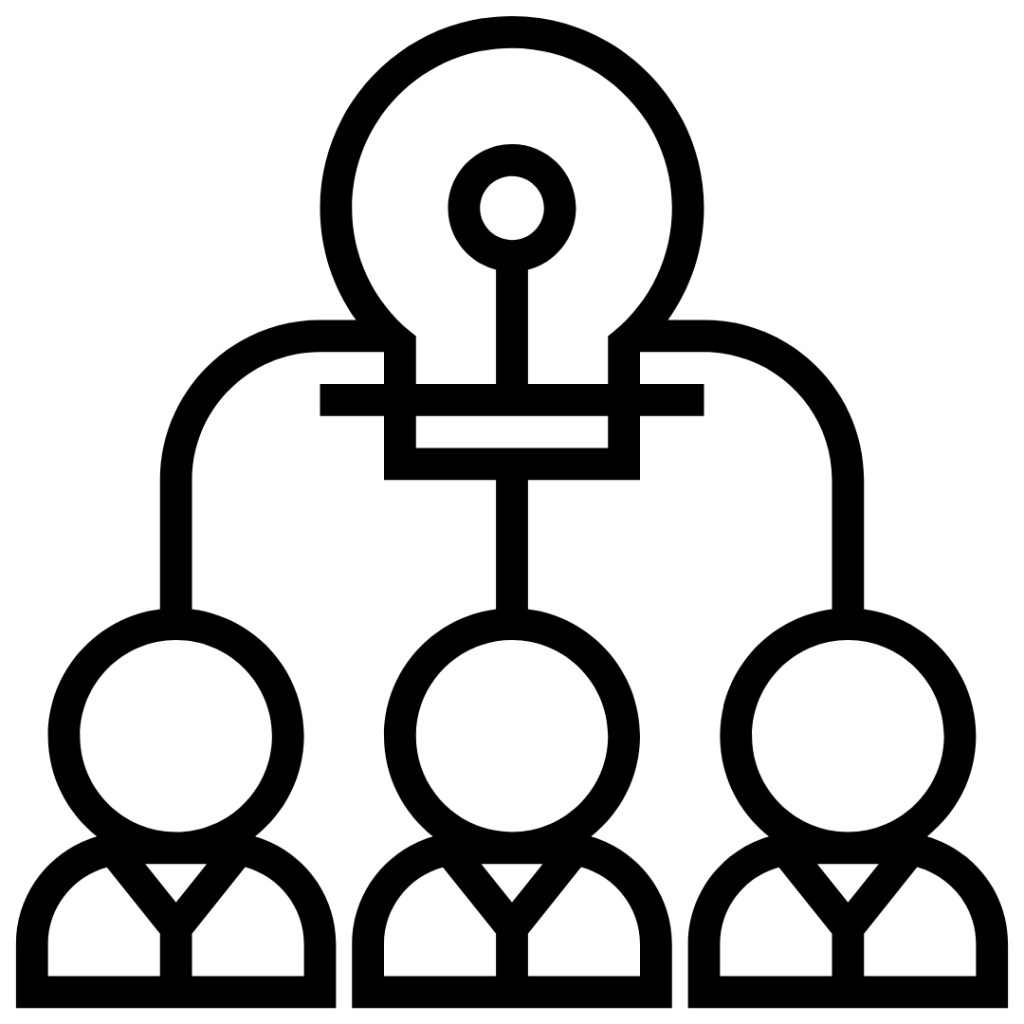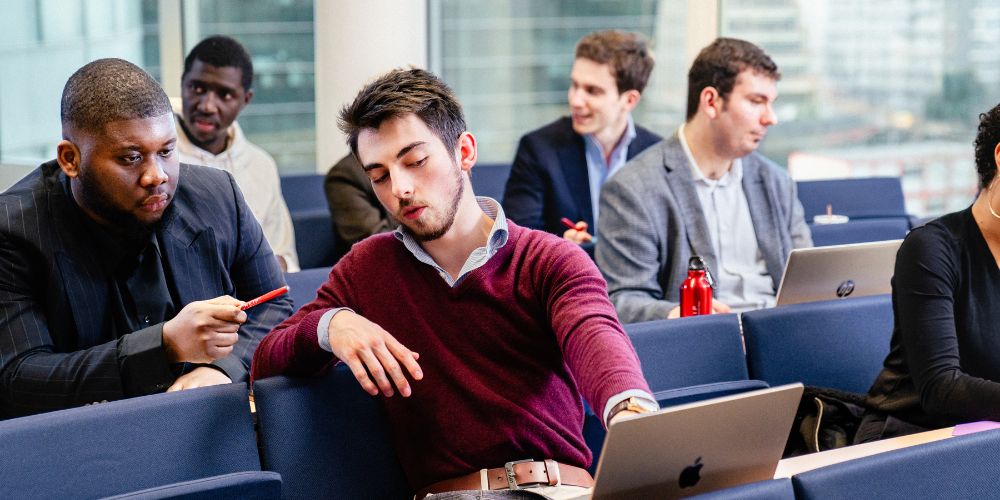Training new CSR players
The main environmental emergencies call for a shift towards an economic and social model based on sustainable development. This change is fundamentally revolutionizing the way we produce, work and live.
In this ever-changing context, public and private organizations need qualified professionals to guide them. The innovation and CSR manager is one of these key players.
The training program combines ecological expertise with law and management, a dual skill that is highly sought-after by companies and public institutions such as local authorities, public establishments and international organizations.
On completion of the program, students are destined to become high-level executives, notably in human resources, legal or communications departments. They will be able to define andarticulate a CSR approach, as well as an assertive policy in favor of parity and diversity.
Driven by a deep commitment to preserving the environment and benefiting from solid training, they will be able to convince consumers or the general public to adopt exemplary societal practices.
Our program trains specialists through a comprehensive multidisciplinary approach to contemporary CSR issues, economics, project management, law and institutions. It reinforces the importance of the meaning and values of public service, as well as the culture of private and multi-partner environments.
This course is the result of a solid partnership between two renowned institutions, each recognized for its model of excellence:
- HEIP, an OMNES EDUCATION school with more than 125 years of experience and an education based on excellence, aims to train enlightened citizens and accomplished future professionals. A pioneer in international relations and political science, it has made innovation its DNA, both in terms of teaching content and methodology.
- The Université de Haute Alsace (UHA) is a higher education and research establishment with over 10,000 students, including 16.9% foreign students from 90 countries. Established in 1975 in Mulhouse and Colmar, the UHA occupies three sites in Mulhouse and two in Colmar. It comprises 4 training and research units (UFR), two university institutes of technology (IUT) and 2 engineering schools. UHA offers a range of over 170 degrees.

What is an Innovation and CSR Manager ?
The innovation and CSR manager leads CSR and sustainable development initiatives within his department, whether in the fields of human resources, communications or legal. In order to meet these requirements, training is structured around technical and operational skills:

Technical
- Know how to draw up carbon balances and hazard studies.
- Draw up a code of conduct.
- Learn how to respond to public tenders
- Dealing with environmental disputes.
- Master the management of socially responsible investments, responsible projects and diversity projects.

Methods
Be able to steer transformations using new project management methodologies (Agility) and Design Thinking.

Humanities
Know how to manage a project team by mobilizing socio-relational skills to encourage collaborative work and the co-construction of public digital transformations, which can only succeed through commitment and collective intelligence.
On the other hand, the training is based on a foundation of innovative tools for developing specific expertise and assuming project management responsibilities.
What is the Master’s program in Innovation and CSR Management?
MAIN COURSES
The teaching offered is structured in Pedagogical Teaching Units (UEP) spread over 4 semesters (2 years) and totals 882 hours of classes.
1st year
Objectives :
- Understand the evolution of digital services (trends and priorities over the years) and their impact on the service provided to beneficiaries, on public organizations and their operating methods.
- Understanding the legal and regulatory framework for the digital transformation of public services
- Understand the mechanisms of public procurement and the contractual relationship between public entities and private service providers
Main courses Semester 1 :
- UEP 1 – Approach to CSR values
- UEP 2 – Economic and legal regulation of the labor market
- UEP 3 – Social environment of public and private organizations
- UEP 4 – Institutional environment of public and private organizations
- UEP 5 – Methods and learning 1
Main courses Semester 2 :
- UEP 6 – Societal management of human resources
- UEP 7 – Fundamental legal and accounting instruments (public and private)
- UEP 8 – Social environment of public and private organizations
- UEP 9 – CSR tools
- UEP 10 – Methods and learning 2

2nd year
Objectives :
- Develop an in-depth understanding of the social issues related to CSR and sustainable development. All courses focus on the acquisition of skills dedicated to social and environmental responsibility and sustainable development. Most are taught by professionals in the fields of management, sustainable development and eco-responsibility.
- Gain significant experience, either through a work-study program or a minimum four-month internship.
Main courses Semester 3 :
- UEP 1 – Social challenges of CSR
- UEP 2 – CSR standardization and regulation
- UEP 3 – CSR and human resources management
- UEP 4 – Business English
- UEP 5 – CSR control
- UEP 6 – Responsible project management
- UEP 7 – CSR and sustainable development
Main courses Semester 4 :
- UEP 8 – CSR and corporate strategy
- UEP 9 – Sustainable finance
- UEP 10 – CSR and environmental protection
- UEP 11 – Work placement or apprenticeship

Certification TASK
International Certificate of Sustainability Knowledge
The world and organizations are short of experts capable of solving ecological problems in their respective fields.
It is therefore becoming imperative to generalize acculturation to sustainability and ensure that a growing number of graduates and professionals acquire a sufficient understanding of this fundamental concept.
With a view to standardizing knowledge on an international scale, Sulitest has developed TASK, the first international sustainability knowledge certificate.
Internationally recognized as a benchmark for recruiters, this universal knowledge test, focusing on socio-ecological issues, attests to a level of knowledge on the job market.
That’s why HEIP is expanding its program to include this exam. What’s more, this initiative is aligned with educational frameworks such as UNESCO’s Education for Sustainable Development learning objectives, GreenComp, and the French Ministry of Higher Education, Research and Innovation’s report “Sensibiliser et former aux enjeux de la transition écologique dans l’enseignement supérieur” (“Raising awareness and training for the challenges of ecological transition in higher education”), directed by Jean Jouzel.

TEACHING UNITS* DETAILS
1st year
EU 1 – Approach to CSR values
- Introduction to CSR
- Economics of globalization
EU 2 – ECONOMIC AND LEGAL REGULATION OF THE LABOR MARKET Economic and legal regulation of the labor market
- In-depth labor law I
- Labour economics
EU 3 – Social environment of public and private organizations
- Sustainable development
- International labor law
UE 4 – Institutional environment of public and private organizations
- Contract technology
- Socially responsible management
- Document search SCD
UE 5 – Learning methods 1
- Research Methodology
- Business English
EU 6 – Societal management of human resources
- Human resources management
- Contract drafting
- Sociology of industrial relations
UE 7 – Fundamental legal and accounting instruments (public and private)
- Company law
- Financial management
UE 8 – Social environment of public and private organizations
- Advanced labor law 2
- Social protection law
- Corporate tax law
- Intellectual property law
EU 9 – CSR tools
- Responsible project management
- Sustainability marketing
- Consumer behavior and sustainable development
- Responsible purchasing
UE 10 – Methods and learning 2
- Responsible project simulation
- Digital research methodology
- Building a CSR-related career plan
- Presentations by CSR professionals
- Business English
- Internship (thesis defense)
2nd year
EU 1 – Social issues of CSR
- Introduction to CSR law
- A philosophical approach to responsibility
- Theories of society
- Structure theory and human choice theory in the face of CSR
- History of Paternalism
UE 2 – CSR standardization and regulation
- The making of CSR standards
- European and international CSR law: encouraging the development of CSR by public authorities (international and internal standardization)
- Regulation by private bodies (technical standards, codes of conduct)
EU 3 – CSR and human resources management
- Diversity Management: Accompanying Measures Talent, Leadership & Change Intergeneration
- Sustainable human resources management Human rights
- Long-term relations with social partners and collective bargaining (trade unions) Occupational health and safety
UE 4 – Business English
The overall aim of this course is to perfect oral and written expression skills in English, to ensure the acquisition of business and management vocabulary and to consolidate active mastery of grammar.
EU 5 – Monitoring CSR
- Business ethics and deontology
- Overview of CSR control
- CSR diagnosis and audit
- CSR and economic and financial performance
- Focus on the digital transformation of public procurement
- Consideration, management and assessment of risk in public procurement (reversibility issues, etc.).
- Expressing needs and analyzing bids
- The project manager’s role in contract execution and interactions with buyers and suppliers. Case study on the analysis of a candidate’s offer (highlighting requirements, risk analysis, role of the buyer and role of the CP, etc.).
EU 6 – Responsible project management
The general aim of this teaching unit is to discover the tools of project management, and become familiar with the specific vocabulary and procedures involved.
and the documents you need to manage a responsible project. Management simulation exercises make up the majority of courses.
EU 7 – CSR and sustainable development
- Social and environmental responsibility of public organizations
- Responsible consumption
- International and national sustainable development issues
- Impact of economic activity: carbon footprint; hazard studies; impact studies
EU 8 – CSR and corporate strategy
- Responsible purchasing
- Governance and CSR
- Stakeholder dialogue
- CSR marketing/communication
- NGO/corporate relations CSR tools
- Strategic management
EU 9 – Sustainable finance
- Socially responsible investment
- NGOs and Fundraising
- Ethics and the banking system
EU 10 – CSR and environmental protection
- European and international environmental law
- Integrating environmental protection into corporate strategy
UE 11 – Internship or apprenticeship
Defense of a professional thesis or research paper.
*Thecontent of the teaching units is valid for the start of the 2024/2025 school year and may be reviewed annually.
What is the recognition of the Manager of Innovation and CSR diploma?
This course leads to the following certificates and diplomas:
- Innovation and CSR” school certificate awarded by HEIP
- Master’s degree in “Innovation, Enterprise and Society” awarded by the University of Haute Alsace
- Professional certification of “MASTER – Innovation, Enterprise and Society” level 7(EU), NSF code 122 / 310 /128, issued by the University of Haute-Alsace, registered under number 34847 in the RNCP (Répertoire National des Certifications Professionnelles) by decision of the Director General of France Compétences dated 22/06/2018.
- TASK Certificate (The Assessment of sustainability Knowledge by SULITEST)
ECTS credits
European Credits Transfer System. These credits validate a student’s skills and level of higher education, based on the workload required to achieve the program’s objectives, which are defined in terms of knowledge and skills to be acquired. Each validated year of higher education results in 60 ECTS credits, recognized throughout Europe.

How does the Master’s degree in Innovation and CSR Management work?

Teaching methods
We’re convinced that a strong learning experience can only be achieved through a systemic approach, by combining theory with the practicalities of field experimentation, and by sharing real-life experiences.
- A program built around theoretical and methodological courses and practical exercises (case studies, simulations, field work).
- A professionalizing curriculum that helps everyone to grasp the challenges of our world and implement appropriate support solutions .
- The courses are taught by academics who are experts in the field, and practicing professionals who are able to draw on their practical experience to provide an enlightened vision of the current situation and outlook for these issues.
- A program that offers ongoing assessments of professional situations to test the theoretical framework and develop mastery of the tools.
- The program is based on TASK by SULITEST, the first international certificate of sustainability knowledge.

Format of learning modalities :
- Lectures and tutorials in small groups
- Group work
- E-learning
- Seminars and face-to-face courses

Evaluation methods
- Continuous assessment and half-yearly mid-term exams by skill block
- Workplace situations
- Written case studies
- Individual and group work
- Professional thesis or research paper
- Oral defense before a jury of professionals and teachers.

Each semester, students are supported in :
- Preparation for the professional world
- In the realization of individual or collective projects
- Organizing lecture series

Practical details
For the 2024-2025 academic year.
The program will be delivered at our Paris campus.
A total of 882 hours of teaching are offered.
20-30% of courses can be delivered remotely and/or asynchronously.
What are the admission requirements for the Master’s degree in Innovation and CSR Management?
RELEVANT PROFILES
Admission requirements for Master 1 :
Admission to the Master 1 program is by application, competitive entrance examination and individual interview. A panel of experts, chaired by the head of the Master’s program, examines the candidates’ applications.
For the start of the 2024-2025 academic year, only M1 is open.
LEVEL REQUIRED
- French Bac +3 or a foreign diploma validating 180 ECTS in Law, Political Science, Social Science or Economics.
- HEIP diplomas:
- Bachelor in International Relations and Political Science
- Bachelor of Arts in Humanities subject to presentation of a DALF C1 certificate
- Licence Professionnelle Project Manager for Sustainable Development & Transitions
What are the work opportunities after the Master’s degree in Innovation and CSR Management?

On completion of the Master’s program, students will have the opportunity to work for public or private companies looking for skilled CSR professionals.
Examples of possible professions:
- Lawyer,
- Human resources manager,
- Director of Communications,
- Societal rating manager in an agency or auditing firm,
- CSR expert in a trade union, NGO or institution wishing to develop a critical assessment of companies’ social and environmental policies,
- Sustainable development or diversity officer in a local authority.
What are the tuition fees for the Master Manager of Innovation and CSR for the 2024-2025 academic year?
PER YEAR
TUITION FEES
Master 1
- 80 administration fee
- 11,000€ with a €1,100 reservation deposit
- 100€ CVEC tax to be paid before the start of the school year following registration
These rates are valid for the start of the 2024/2025 school year and may be reviewed annually.
Practical information about the Master’s degree in Innovation and CSR Management
Speakers

All our speakers are lecturers or experts in their field.
They all have at least 5 years’ higher education and 3 to 5 years’ professional experience. Find out more about our faculty.
Campus

PARIS CŒUR DÉFENSE 2
82 Esplanade du Général de Gaulle
92934 Paris La Défense – France
Accessibility

The HEIP admission process is accessible to people with physical disabilities since the competition is 100% online.
For people with invisible or mental disabilities, the admission teams may adapt the tests.
All HEIP campuses (Paris, Lyon, Bordeaux and London) are accessible to people with reduced mobility.
OMNES Education’s CSR approach

Lyon disability contact: Jordan Delplace



